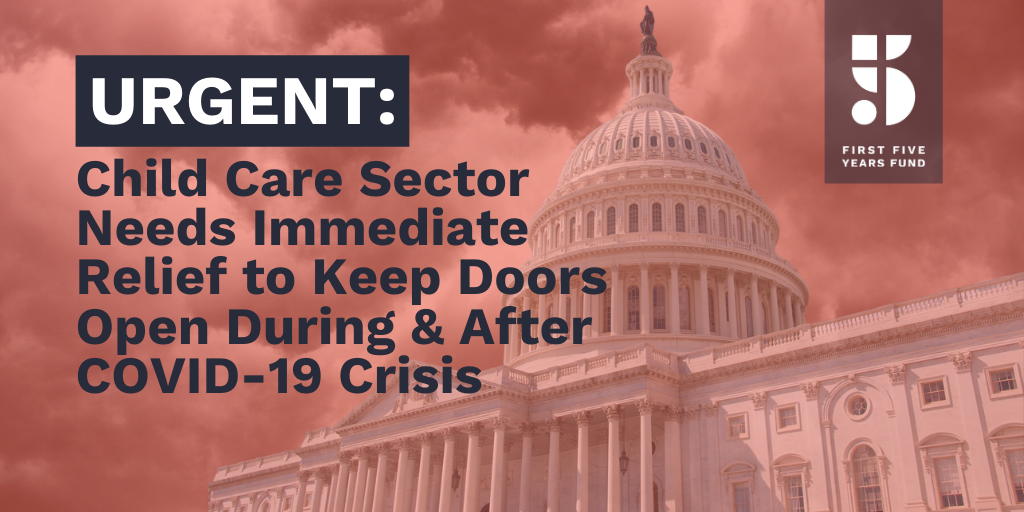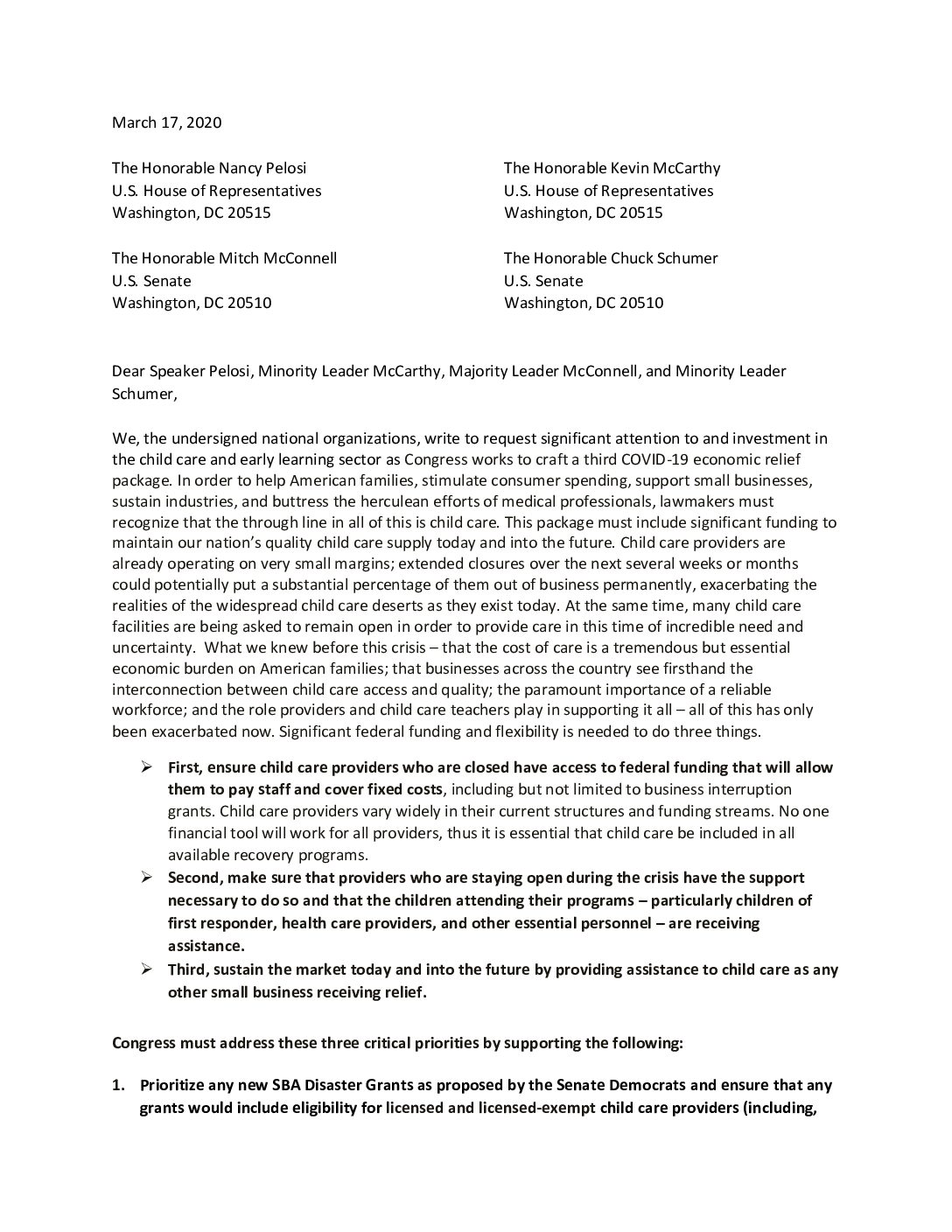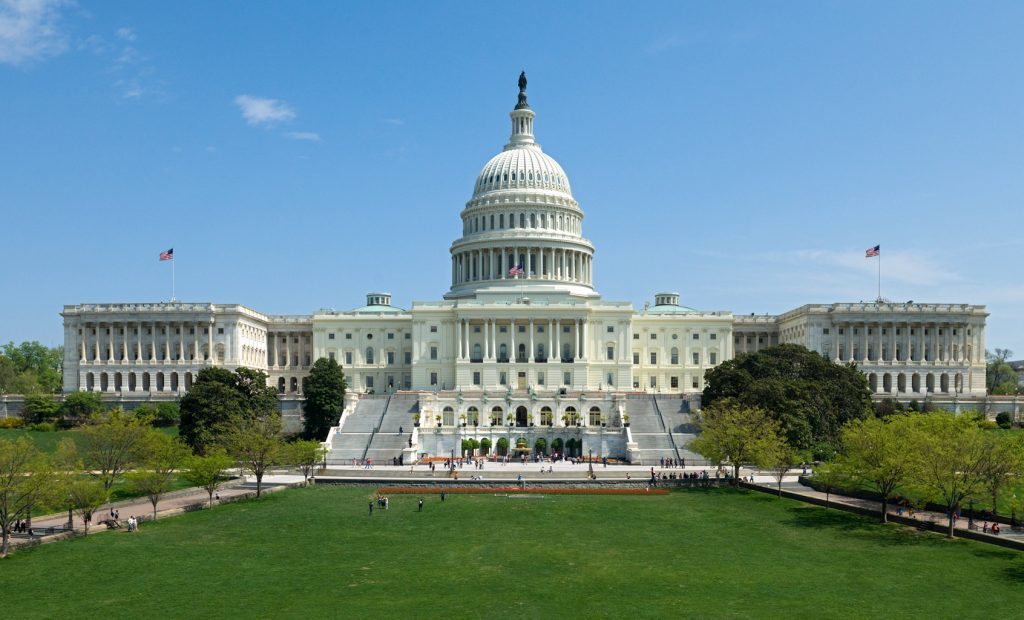Urgent Request to Congress for Child Care Sector in COVID-19 Economic Stimulus Package


3/19/20 UPDATE: FFYF worked with our partners to assemble important data and information as further evidence for the need for substantial funding from the federal government for the child care industry. That information is available here.
Today the First Five Years Fund was joined by many of the nation’s leading child advocacy organizations in sending a letter to Congress detailing essential recommendations for lawmakers to consider as they develop an economic stimulus package in response to the COVID-19 crisis. Under normal circumstances, child care providers already operate on very small margins, and extended closures over the next several weeks or months could potentially put a substantial percentage of them out of business permanently, exacerbating the realities of the widespread child care deserts as they exist today. At the same time, many child care facilities are being asked to remain open, with only a fraction of the income they normally make, in order to provide care in this time of incredible need and uncertainty.
March 17, 2020
The Honorable Nancy Pelosi
U.S. House of Representatives Washington, DC 20515
The Honorable Mitch McConnell
U.S. Senate
Washington, DC 20510
The Honorable Kevin McCarthy
U.S. House of Representatives
Washington, DC 20515
The Honorable Chuck Schumer
U.S. Senate
Washington, DC 20510
Dear Speaker Pelosi, Minority Leader McCarthy, Majority Leader McConnell, and Minority Leader Schumer,
We, the undersigned national organizations, write to request significant attention to and investment in the child care and early learning sector as Congress works to craft a third COVID-19 economic relief package. In order to help American families, stimulate consumer spending, support small businesses, sustain industries, and buttress the herculean efforts of medical professionals, lawmakers must recognize that the through line in all of this is child care. This package must include significant funding to maintain our nation’s quality child care supply today and into the future. Child care providers are already operating on very small margins; extended closures over the next several weeks or months could potentially put a substantial percentage of them out of business permanently, exacerbating the realities of the widespread child care deserts as they exist today. At the same time, many child care facilities are being asked to remain open in order to provide care in this time of incredible need and uncertainty. What we knew before this crisis – that the cost of care is a tremendous but essential economic burden on American families; that businesses across the country see firsthand the interconnection between child care access and quality; the paramount importance of a reliable workforce; and the role providers and child care teachers play in supporting it all – all of this has only been exacerbated now. Significant federal funding and flexibility is needed to do three things.
- First, ensure child care providers who are closed have access to federal funding that will allow them to pay staff and cover fixed costs, including but not limited to business interruption grants. Child care providers vary widely in their current structures and funding streams. No one financial tool will work for all providers, thus it is essential that child care be included in all available recovery programs.
- Second, make sure that providers who are staying open during the crisis have the support necessary to do so and that the children attending their programs – particularly children of first responder, health care providers, and other essential personnel – are receiving assistance.
- Third, sustain the market today and into the future by providing assistance to child care as any other small business receiving relief.
Congress must address these three critical priorities by supporting the following:
- Prioritize any new SBA Disaster Grants as proposed by the Senate Democrats and ensure that any grants would include eligibility for licensed and licensed-exempt child care providers (including, home-based, center-based, non-profit, and for-profit.) Providing direct grants for eligible small business recipients to help cover the cost of lost business, the cost of providing paid sick and family leave, and more is critical to preventing many child care providers from permanently closing. Providers of all types often operate on razor thin margins and would not have the ability to pay back a loan of any kind. Data from a survey NAEYC has distributed in the last three days indicates that many child care centers and homes are not going to be able to survive a closure; up to a third in some states indicate they won’t survive a closure of any period—another third won’t survive a closure of more than two weeks. In other words, a temporary closure is, for many, a permanent one.
- In any pending or future industry specific stimulus proposals the unique needs of licensed and licensed-exempt child care providers, as essential pieces of the national infrastructure must be considered by ensuring:
- Federal assistance is needed to establish and provide paid sick and family leave in public health emergencies. Child care providers are small businesses, running on very small margins and do not have the Human Resource capacity to operationalize leave programs requiring arduous paperwork and burdensome procedures, particularly during this time of crisis when their focus should be solely on serving children and families.
- All child care system closures are accompanied by additional, necessary policies and funding that allows for access to unemployment compensation for all staff who work in center-based child care or own/operate/are staff of family child care homes.
- Child care programs, in centers and homes, are automatically enrolled in mortgage forbearance, provided rent deferrals (when applicable), and given support for utility and insurance payments, for a minimum of three months and up to six months.
- Provide funding to support child care programs that are being asked to remain open to serve essential and front-line workers, in which the programs are provided additional funding to cover the increased risks, pay and costs of maintaining services. Providers should be given clear guidance on how to remain safe and practice social distancing and minimal contact while continuing to provide the quality care children and families need.
- Regulatory Considerations
- Ensure emergency, disaster funding under the Stafford Act has the flexibility to provide direct funding assistance to all types of licensed and licensed exempt child care providers (including, home-based, center-based, non-profit and for-profit) to address immediate needs such as emergency staffing, costs associated with cleaning and sanitizing facilities, and providing training and support to staff.
- If funding for these recommendations should go through CCDBG, the Administration has flagged that in some cases, states may need to enact state legislation or regulation in order to take advantage of these flexibilities. They also may need to submit a Plan amendment or waiver request to OCC. We have concerns about any delays in the distribution of funding this may cause.
- Provide funding and authorization for Child Care Development Fund State Administrators to make grants to programs who are at risk of closing but are providing care in areas of high need such as first responders and health care. Similarly, any funding going directly to states for immediate needs as determined locally, should have child care as an allowable use.
- Significant funding to support the authorized flexibility included in the recently released guidelines from the Administration for Children and Families (ACF).
- Provide increased funding to the State Lead Agency with jurisdiction over child care to waive income eligibility and what counts as income.
- Lead Agencies have the flexibility to define income and to set the income threshold for purposes of CCDF eligibility.
- Lead Agency could waive the income eligibility to allow all families who need care to receive it, particularly children of first responders, health professionals, and other essential personnel.
- Lead Agency could exclude disaster relief or other forms of temporary assistance from counting as income.
- Provide increased funding so child care providers can waive co-payments.
- Under 45 CFR 98.45(k)(4), Lead Agencies have the option to waive family co-payment requirements for families that meet criteria established by the Lead Agency—which may include, for example, families whose employment status is impacted by COVID-19.
- Lead Agencies could use this option to ensure equal access for families impacted by COVID-19.
- Pay for Lead Agencies to offer supply-building grants to licensed and licensed exempt providers.
- Financial assistance to target providers that experience a disruption in subsidy receipt due to COVID-19.
- Financial assistance for child care providers while they are unable to serve families in a manner necessary to meet applicable standards for healthy and safety.
- Grants or contracts to providers for equipment, supplies, professional development and staffing, or other costs.
- Training and technical assistance to providers to gain knowledge, skills, and abilities they need to operate in a world post COVID-19.
- Continue to pay licensed and licensed exempt providers, if child care programs close and/or parents keep their children home due to COVID-19.
- Lead Agencies must modify their absence policy to pay providers if programs are closed or children are absent due to COVID-19.
- Lead Agencies must pay providers based on a child’s enrollment rather than attendance (45 CFR 98.45(l)(2)(i)).
- Pay for the expenses associated with broadening the Lead Agency’s definition of protective services to permit emergency eligibility.
- In emergency situations, Lead Agencies have the option of deeming children affected by COVID-19 to be in need of protective services and therefore, the eligibility requirements (e.g., income threshold, work/training requirement) could be waived.
- Provide immediate assistance to impacted families/providers, even if they are not on CCDF.
- Such an expenditure could be viewed as a necessary to retain the child care supply during the State’s shutdown.
Early childhood education programs are essential for the millions of children and families they serve, and are particularly crucial during this emergency public health and economic crises. But their success is contingent upon receiving the robust investment they need to take necessary steps and precautions. We urge lawmakers to act swiftly to allocate substantial emergency flexible funding directly to the child care and early learning system in this country.
Sincerely,
Alliance for Early Success
Bipartisan Policy Center (BPC)
Center for American Progress (CAP)
Child Care Aware of America (CCAoA)
Council for a Strong America (CSA)
Early Care and Education Consortium (ECEC)
Educare Learning Network (ELN)
First Five Years Fund (FFYF)
National Association for the Education of Young Children (NAEYC)
National Head Start Association (NHSA)
Ounce of Prevention Fund
Save the Children Action Network (SCAN)
Subscribe to FFYF First Look
Every morning, FFYF reports on the latest child care & early learning news from across the country. Subscribe and take 5 minutes to know what's happening in early childhood education.




